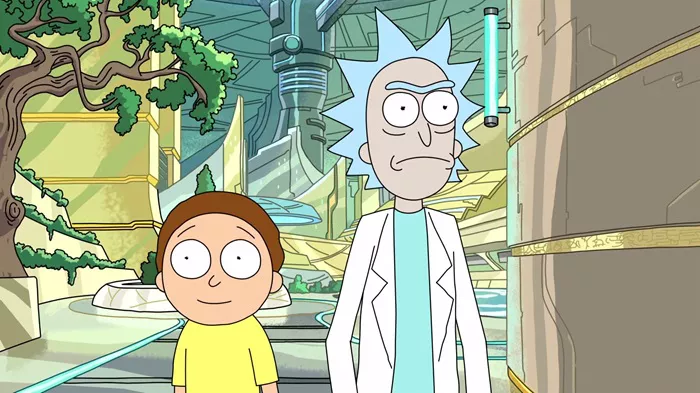In the animated series Rick and Morty, created by Dan Harmon and Justin Roiland, the dynamic between the brilliant but eccentric scientist Rick Sanchez and his naive, good-hearted grandson Morty Smith forms the emotional core of many episodes. Throughout the series, viewers are left questioning the true nature of Rick’s feelings towards Morty—is it genuine care and concern, or is it merely a facade masking deeper complexities?
Rick and Morty: A Dysfunctional Duo
Rick Sanchez: The Genius Cynic
Rick Sanchez is portrayed as a genius scientist with a penchant for alcoholism and a disdain for authority and societal norms. His intelligence is matched only by his nihilistic worldview, often viewing the universe as devoid of meaning—a perspective that colors his interactions with everyone, including Morty. Despite his brilliance, Rick’s personal flaws and emotional baggage often lead him to act selfishly, prioritizing his own desires over the well-being of those around him.
Morty Smith: The Innocent Sidekick
In contrast, Morty Smith is Rick’s naive and often unwitting sidekick. He is characterized by his simple-mindedness and good-hearted nature, which frequently clash with Rick’s cynical and morally ambiguous behavior. Morty’s journey throughout the series is marked by moments of growth and self-discovery as he navigates the chaotic and often dangerous adventures orchestrated by his grandfather.
Exploring the Dynamics: Does Rick Care About Morty?
The Paradox of Rick’s Behavior
One of the central themes in Rick and Morty is the paradoxical nature of Rick’s relationship with Morty. On the surface, Rick frequently dismisses Morty as unintelligent and expendable, often referring to him as a “shield” or a “tool” to achieve his goals. This dismissive attitude suggests a lack of genuine care or affection. However, deeper analysis reveals moments where Rick’s actions betray a hidden layer of concern for Morty’s well-being, albeit in unconventional ways.
Moments of Vulnerability and Protection
Throughout the series, there are instances where Rick displays protective instincts towards Morty, albeit subtly. For example, in “The Rickshank Rickdemption” (Season 3, Episode 1), Rick surrenders himself to the Galactic Federation to protect his family, including Morty. This act, while stemming from pragmatic considerations, implies a willingness to sacrifice himself for Morty’s safety—a sentiment echoed in subsequent episodes where Rick goes to great lengths to shield Morty from harm.
See Also: WHERE DOES EVIL MORTY GO?
Emotional Moments and Conflicted Motives
Moreover, Rick and Morty occasionally delves into emotional territory where Rick’s facade of indifference cracks, revealing underlying feelings of attachment towards Morty. In episodes like “The Ricklantis Mixup” (Season 3, Episode 7), viewers catch glimpses of Rick’s emotional turmoil as he confronts alternate versions of himself and Morty, highlighting the complexities of their relationship across different dimensions.
The Influence of Morty on Rick’s Growth
Despite his cynicism, Morty’s presence has a profound impact on Rick’s character development throughout the series. Morty’s innocence and moral compass serve as a counterbalance to Rick’s jaded perspective, often prompting moments of introspection and self-reflection. These moments hint at a deeper connection between Rick and Morty—one that transcends their dysfunctional interactions and reflects a mutual reliance on each other’s strengths and vulnerabilities.
Psychological Analysis: Understanding Rick’s Behavior
Attachment Theory and Rick’s Avoidant Traits
From a psychological standpoint, Rick Sanchez exhibits traits consistent with avoidant attachment, characterized by a reluctance to form close emotional bonds and a tendency to distance oneself from intimacy. This attachment style manifests in Rick’s interactions with Morty, where he oscillates between emotional withdrawal and brief moments of emotional engagement.
The Role of Trauma and Coping Mechanisms
Rick’s cynicism and emotional detachment can be partly attributed to past traumas and unresolved issues, which shape his coping mechanisms and interpersonal relationships. His refusal to acknowledge vulnerability or dependence on others aligns with his overarching desire for autonomy and control—a motif that underpins his dynamic with Morty throughout the series.
Conclusion: Deciphering Rick’s True Feelings
In conclusion, the question of whether Rick actually cares about Morty in Rick and Morty is multifaceted and open to interpretation. While Rick’s actions often convey indifference or manipulation, there are nuanced moments where glimpses of genuine concern and protective instincts shine through. The complexity of their relationship defies simple categorization, reflecting the show’s exploration of existential themes, moral ambiguity, and the blurred lines between selfishness and selflessness.
As viewers continue to dissect the layers of Rick and Morty, one thing remains clear: the bond between Rick Sanchez and Morty Smith is a testament to the show’s ability to blend dark humor with poignant moments of emotional depth, challenging audiences to reconsider their perceptions of love, loyalty, and the complexities of human connection.


